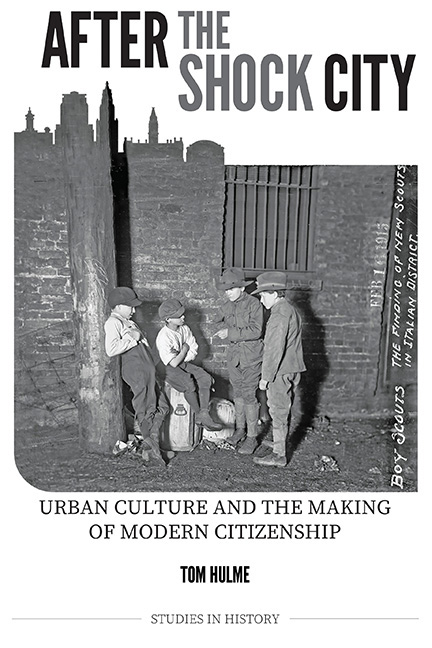Book contents
- Frontmatter
- Dedication
- Contents
- List of figures
- Acknowledgements
- Abbreviations
- Introduction: after the shock city
- 1 Citizenship and the Interwar City
- 2 Urban Utopias and Education
- 3 Celebrating the City
- 4 History, Progress and Community Performance
- 5 The Citizen of Tomorrow
- 6 Civic Culture and Welfare
- Conclusion: after the citizenship city
- Bibliography
- Index
Introduction: after the shock city
Published online by Cambridge University Press: 03 September 2019
- Frontmatter
- Dedication
- Contents
- List of figures
- Acknowledgements
- Abbreviations
- Introduction: after the shock city
- 1 Citizenship and the Interwar City
- 2 Urban Utopias and Education
- 3 Celebrating the City
- 4 History, Progress and Community Performance
- 5 The Citizen of Tomorrow
- 6 Civic Culture and Welfare
- Conclusion: after the citizenship city
- Bibliography
- Index
Summary
On a March afternoon in 1921 an unusual scene unfolded in front of the city hall of Chicago. As a brass band played, onlookers stopped to watch four elephants marching down the street. On the flank of each was a sign advertising an upcoming ‘Pageant of Progress’. Masterminded by the city's eccentric mayor, William ‘Big Bill’ Thompson, this event took place over fifteen days on the Municipal Pier that jutted out into Lake Michigan. Several hundred of Chicago's firms presented exhibits that illustrated the strides in science and industry made in the three decades since the city's famous World's Fair of 1893. Entertainments, such as diving competitions, street parades and Venetian singing, took place alongside the exhibition. Billed locally as ‘the greatest national exposition ever held’, it was a characteristic testament to the ‘I Will’ spirit of Chicago – though onlookers may have seen it as just another brass claim from the ‘Windy City’. Five years later, and over 3,800 miles away across the Atlantic Ocean, a strikingly similar event was held in the British city of Manchester. If the announcement of ‘Civic Week’ lacked the extravagance of elephants, a banner hung from the town hall proclaimed a comparable message: ‘The City keeps open house and provides a wealth of attractions. Invite your friends and tell them to bring their curiosity.’ Mancunians from all sections of society could tour municipal buildings, utility works, factories and a textile exhibition. The programme of events also included entertainment, from singing and dancing to pageants and parades. Mayor Miles Ewart Mitchell boasted that ‘No city in the world has greater resources for such a display’ and claimed that the Civic Week would ‘attract universal attention’.
If civic leaders in Manchester and Chicago were outwardly confident, the economic background of each celebration was gloomier. Both cities depended on industry and commerce and had suffered big falls in production and trade when the brief post-war boom ended. Unemployment was accordingly rising rapidly. Each mayor assured local industrial employers, and the public more generally, that the events would stimulate business, create a demand for labour and help to solve the downturn.
- Type
- Chapter
- Information
- After the Shock CityUrban Culture and the Making of Modern Citizenship, pp. 1 - 17Publisher: Boydell & BrewerPrint publication year: 2019

